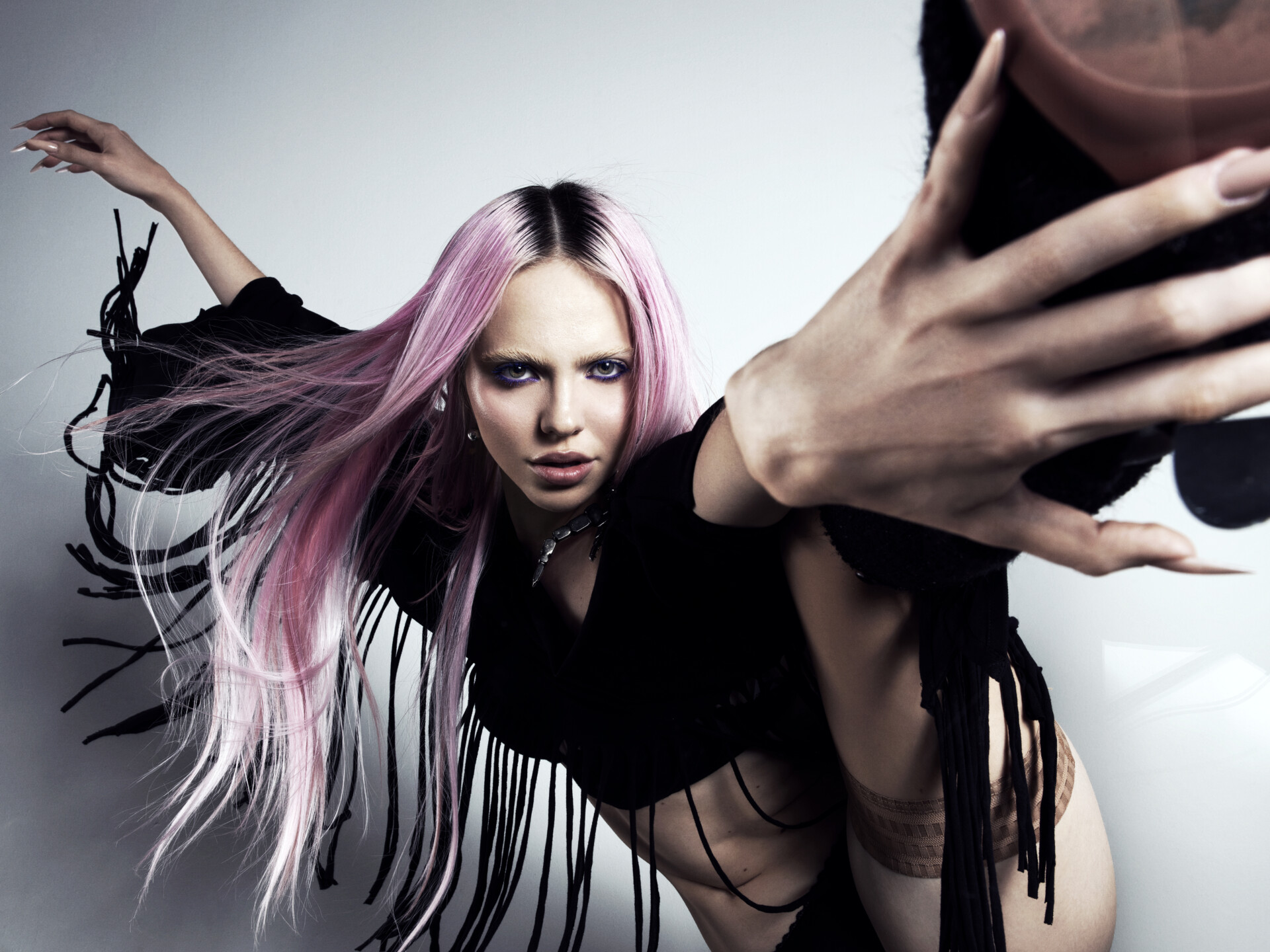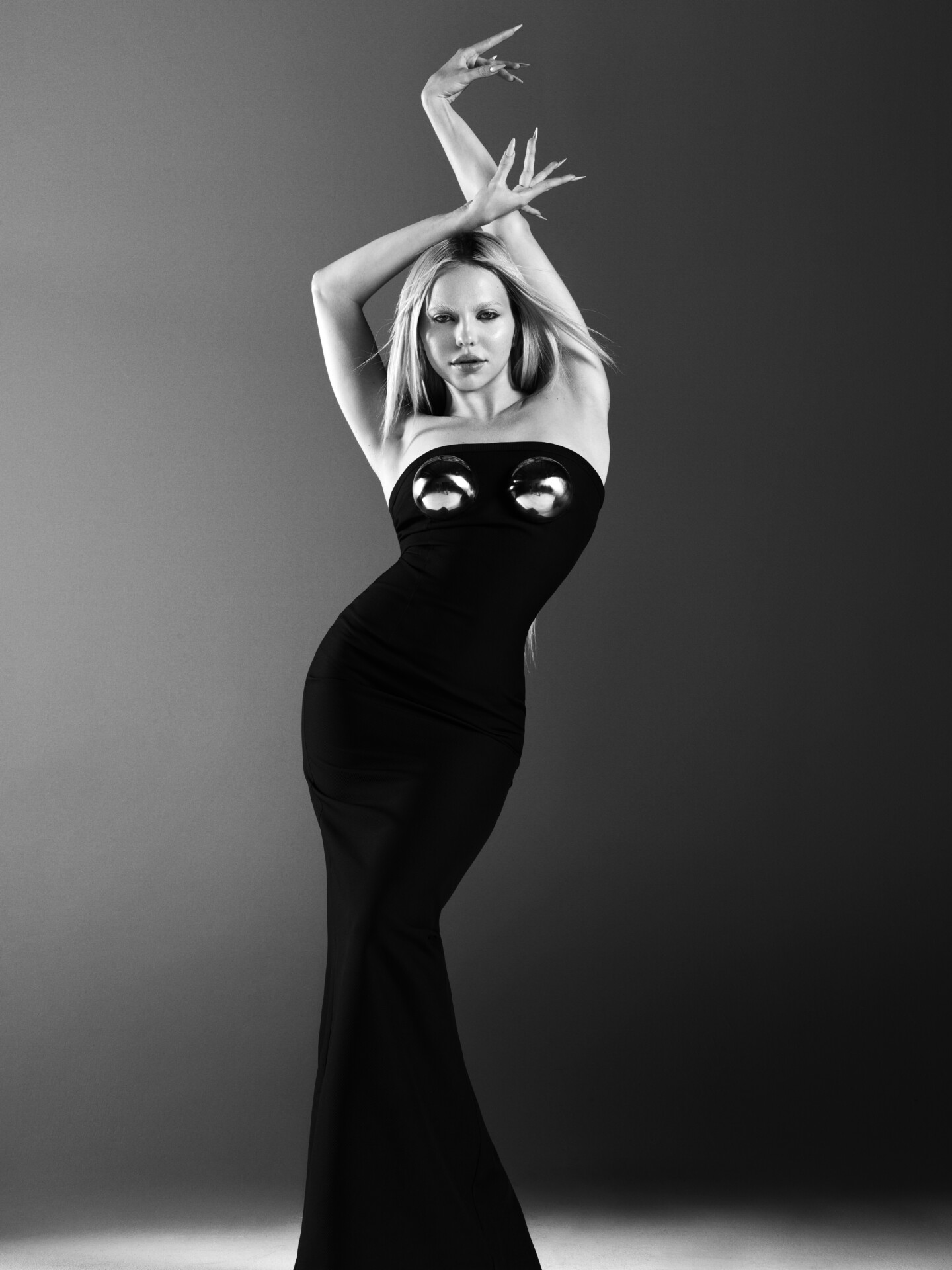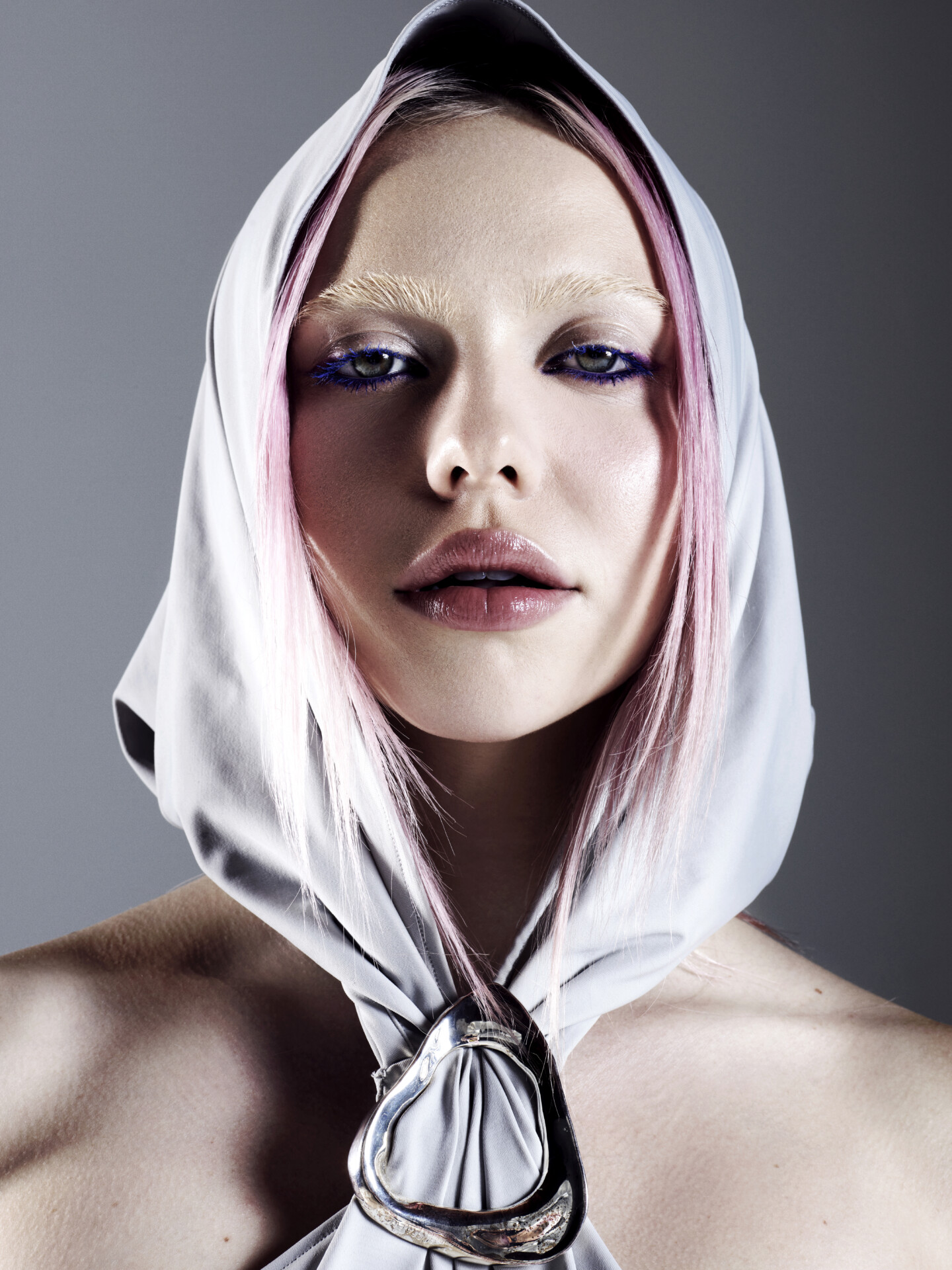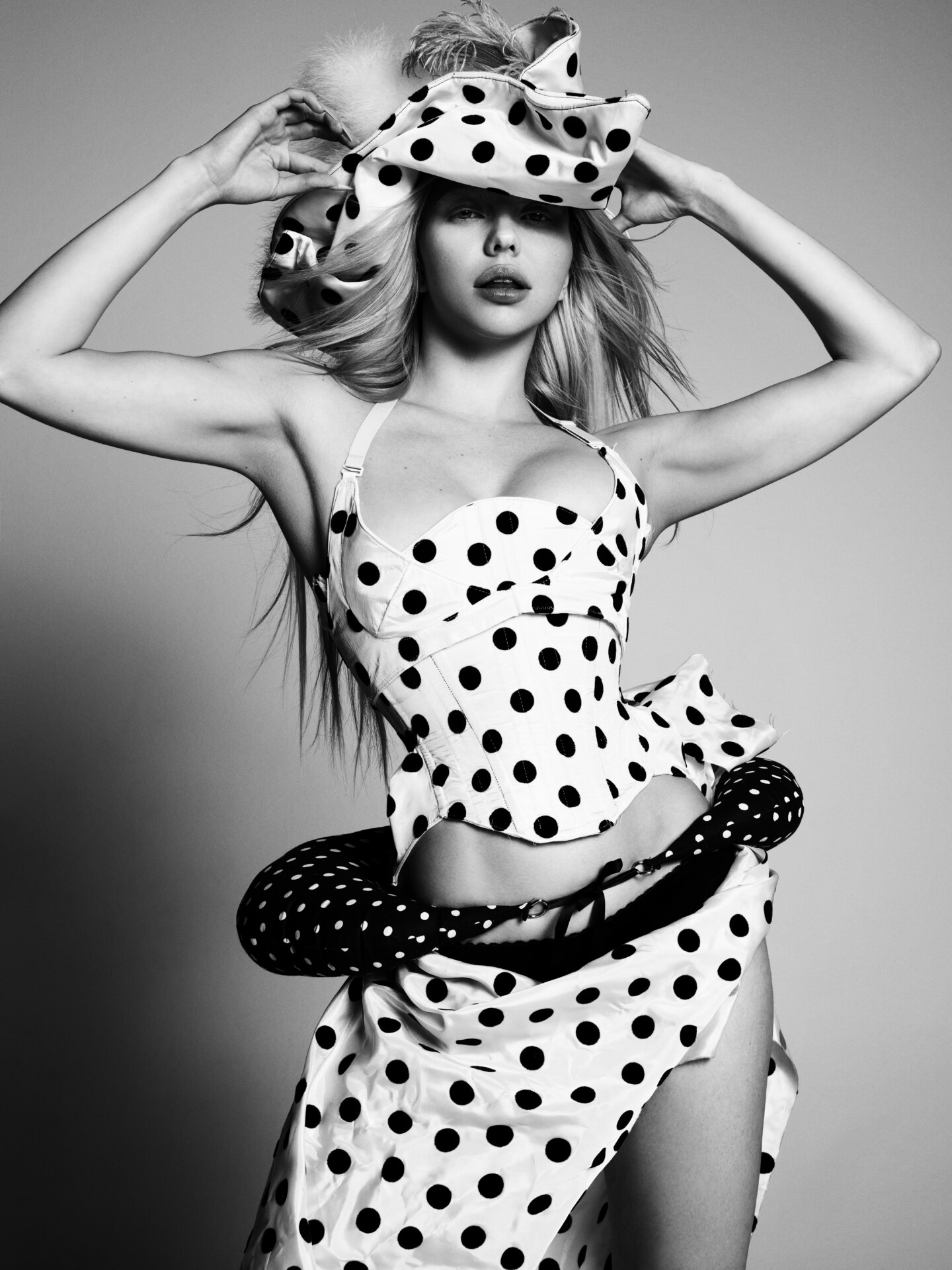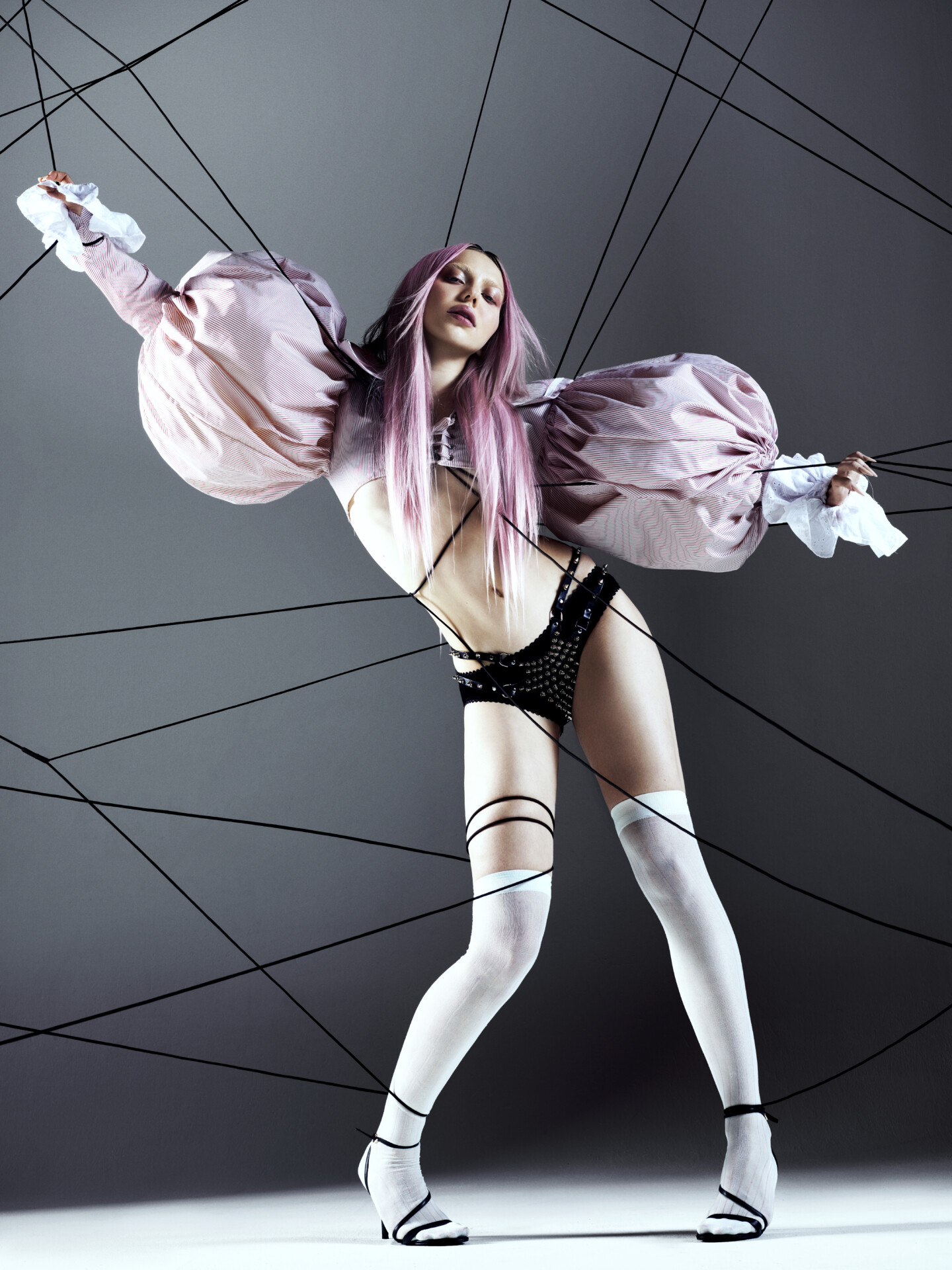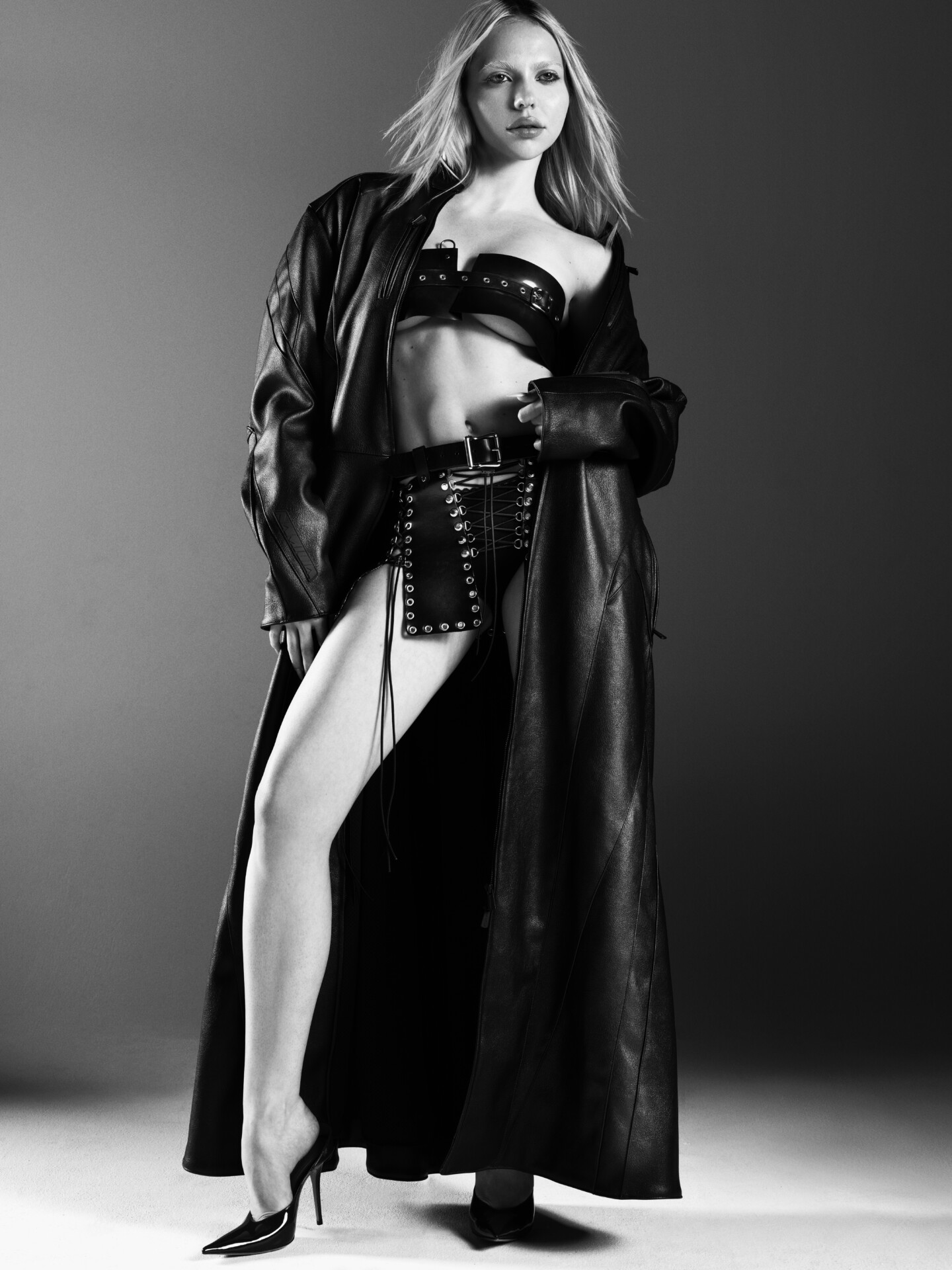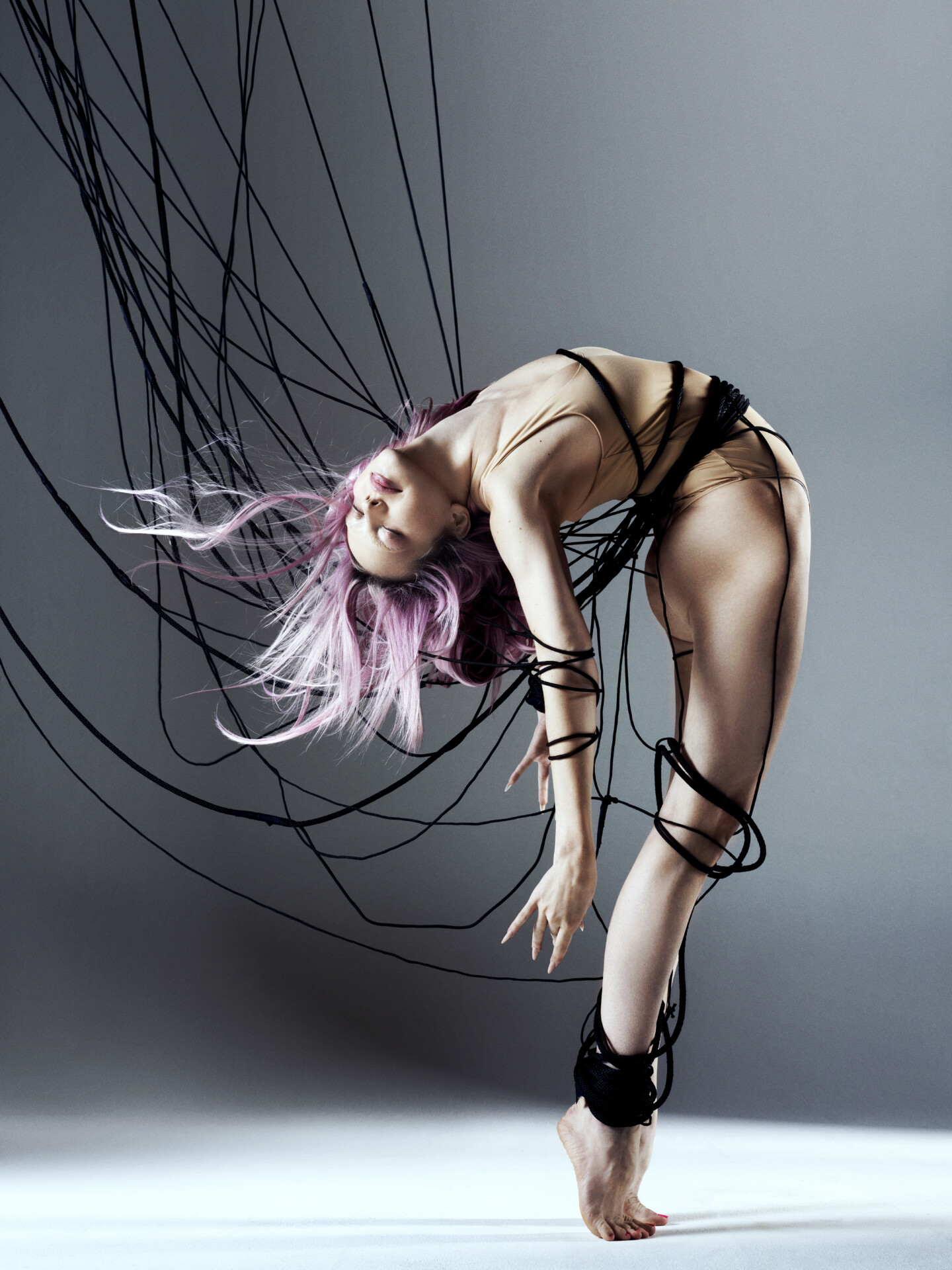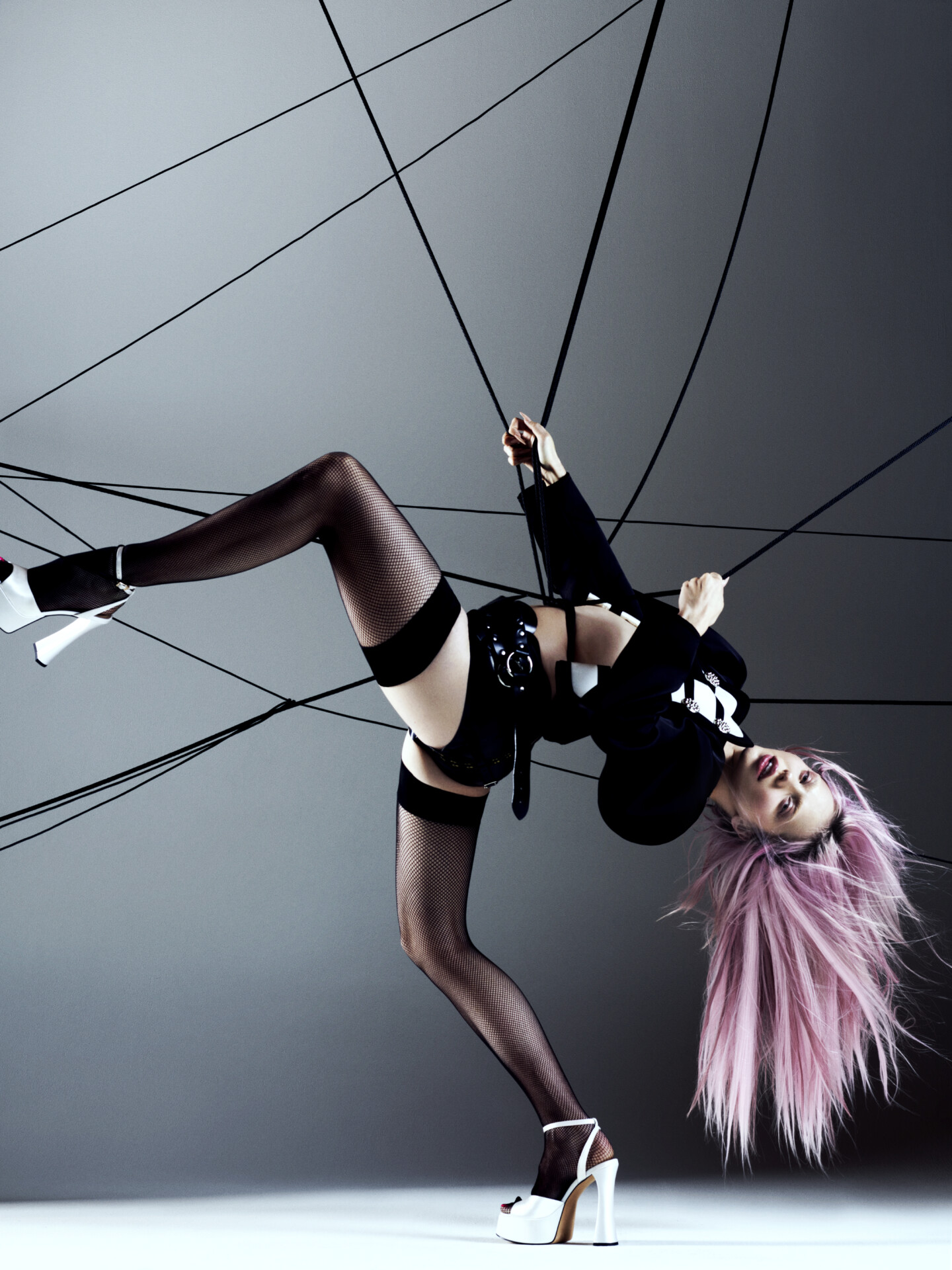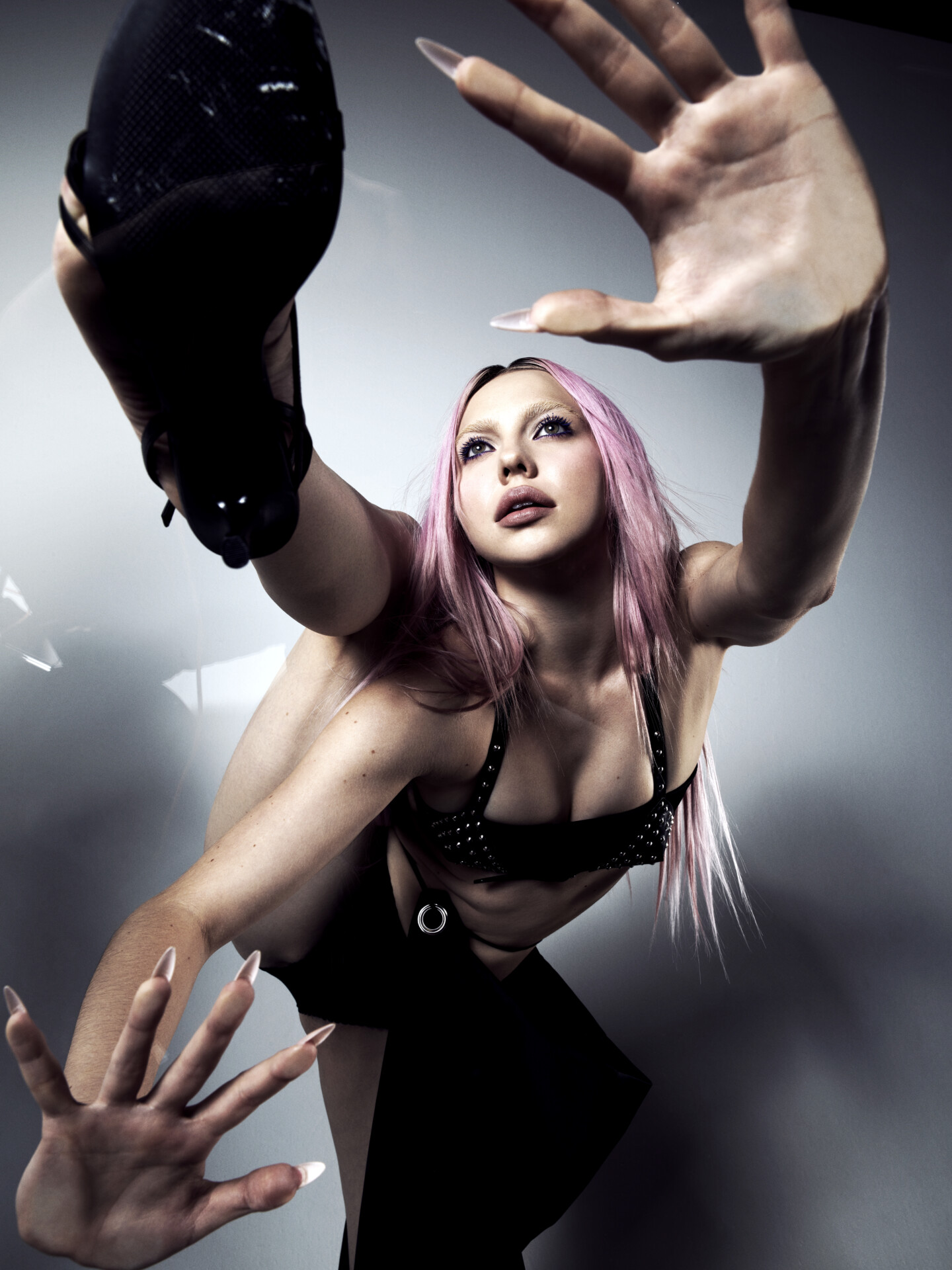From silent dreams to sold-out shows, Adéla turns defiance into art – ushering in a bold new chapter of experimental pop on her own terms.
By Zain Ké, October 2025
When we meet over Zoom, Adéla calls in from the UMG offices in London. She’s fresh off an appearance at Paris Fashion Week and preparing for two sold-out London shows, with a tour soon to take her across the pond. When we talk, there’s a quiet confidence about her – the kind that comes from knowing exactly who you are, even as the world is only just beginning to catch on.
At just 21, the Slovak-born artist has already lived several creative lives – from the rigid discipline of ballet to the high-gloss chaos of Dream Academy, the televised competition that sought to form a girl group and first thrust her into the public eye. Following her elimination, she entered a period of reinvention – one that tested her identity and ultimately redefined her artistry. Out of that chaos came clarity – and The Provocateur, her unapologetic debut EP that cements her as one of the boldest new voices in experimental pop.
Now collaborating with the likes of Grimes and Dylan Brady, Adéla is asserting her place in pop’s avant-garde as an artist in full command of her sound, image, and story. There’s a sharp self-awareness in how she speaks about her journey – the kind that suggests she’s constantly learning, evolving, and interrogating her own perspective. That blend of confidence and vulnerability runs through everything she does, carrying into our conversation as she speaks candidly about authenticity, creative freedom, and the power of turning chaos into creation.
Before looking ahead, Adéla turns back to where it all began – to the world that shaped her, and the roots of the defiance that now define her art.
Zain Ké: You’ve spoken about growing up in Slovakia, where the culture was quite conservative. How did that environment influence the way you understood identity and authenticity – both as a person and eventually as an artist?
Adéla: Being somewhere you feel like you don’t belong can actually be a huge motivator. It pushes you inward. I was a big daydreamer as a kid, I spent a lot of time in my own head, but I believe that’s how the best ideas are born. I was obsessed with American pop culture, but I didn’t tell anyone – it felt strange in this post-communist country where barely anyone spoke English. I learned the language in secret by studying Western shows, music, and media. Looking back, it was a blessing – it gave me space to think for myself, to figure out what I loved and who inspired me. I moved out at fourteen, but those years before that were incredibly formative. Between the ages of nine and thirteen, my philosophies were already forming through what I was consuming. I was completely liberalised, watching Ariana Grande talking about feminism, seeing Miley Cyrus in her Bangerz era pushing ‘free the nipple’, and Lady Gaga being a gay icon. All of that consumption shaped how I saw the world, how I understood self-expression, and what it truly means to be free. But no one else around me thought like that. I’d have these conversations with my family where I’d try to liberalise them, and they’d resist, and I just didn’t understand why no one else seemed as open or curious. It made me realise early on that I thought differently – that I had this other perspective shaped by pop culture and language and art. I’m sure there were others in Slovakia who felt the same way, but at that age, I didn’t have a community to connect with. It was just me, figuring it out. I think that’s where my relationship with authenticity really began. I had to define what was real for me, what felt true, and hold onto that even when it didn’t fit my environment. That instinct to stay true to myself became the foundation of everything I create now.
ZK: It sounds like you always had that pull toward music and pop culture, even when it wasn’t encouraged around you.
A: I’ve just always fucked with pop music – I wanted to do it so badly. But I never told anyone, because I knew people would push back. I think it’s so important not to let that kind of energy affect you. I was scared that if I heard too many opinions, it would make me feel like I couldn’t achieve it, so I stayed quiet for a long time. To my parents and friends, it just looked like a hobby, but deep down, I knew it was my path.
ZK: It shows such wisdom at that age – knowing you had to protect that dream and vision from other people’s doubts.
A: Daydreaming and having goals for myself has kept me alive – it’s always been my north star. If you have to dream in silence, do it. Just don’t let anyone fuck with what matters to you.
ZK: Even if you kept those pop dreams to yourself, you were still expressing yourself creatively in other ways. You started ballet at just three years old – it’s such a disciplined, structured art form. Now you’re making experimental pop. What did you have to unlearn creatively to make that shift?
A: I think the reason I feel so free now is because I was contained for most of my life. It took years to understand how important creative expression and freedom are to me. Growing up in a small country, I thought in a really limited way – like, nobody’s ever done what I want to do, so maybe I should just take what I can get. I told myself, if I have to put my head down and do what people tell me for a while to make it, I’ll do that. But after years of ballet and then being on Dream Academy, I realised I didn’t have to settle. My expression means everything to me, and I want to do it as authentically as possible. I’ve always been outspoken – even in my personal life. You could see it on Dream Academy as well; I was always the one who spoke up. So it only makes sense for me to do the same in my art. It was a journey to get here, though. Looking back, I can see that what I was really craving was creative control – to be able to express myself fully. I’ve always craved singing, music, making something that’s mine.
ZK: Speaking of the show – you’ve mentioned that the period after your elimination was one of intense rebuilding for you, both artistically and personally. You’ve even called it one of the hardest years of your life. I’ve always believed the most fruitful periods come after hardship. How did that time of rediscovery and turbulence change your perspective or trajectory as an artist?
A: There were a few years after the show that were really, really hard. I didn’t feel like I was doing what I was meant to be doing. And yeah, I agree with you – once you come out of that kind of hardship, it feels incredible. I think everyone has to go through tough periods – having doubt, not knowing what you’re doing, making mistakes, trying things that don’t work. It’s essential. Even if it’s not working out – you’re still trying, and that means you’re doing something. For me, all of that – ballet, the show, all the experiments – it helped me realise what wasn’t right. It taught me to trust my gut. Everything really does happen for a reason. It’s easy to look back and feel bitter or think you wasted time, but that mindset will only hold you back. The people who keep going, who stay open and keep moving forward – those are the ones who succeed and grow.
ZK: I completely agree. Failure should still be celebrated – it means you’re trying. It’s all trial and error before finding your place eventually. You have to keep pushing through it, which is exactly what it sounds like you did.
A: Absolutely.
ZK: Okay, we need to talk about The Provocateur – I’m obsessed. I’ve been playing it nonstop.
A: That makes me so happy!
ZK: For readers discovering you for the first time, how would you describe your sound?
A: Honestly, I’d rather people just listen. I don’t love describing it – it’s pop music, but a little experimental. Harder pop, I’d say.
ZK: If you don’t want to define it – is there a specific feeling you hope to evoke in people? Some artists want listeners to take what they want from the music, while others hope to inspire something like freedom or joy. What about you?
A: I think I’m one of those artists who’s like – whatever it means to you, that’s what it is. But my hope is that people see me, my story, and my project and feel inspired. I want them to feel like it’s okay to be themselves, to try, to fail, to be misunderstood – and to know that being misunderstood doesn’t mean you’re wrong. It’s okay to stand in your truth, relentlessly. There are things I wish people understood, sure, but I also love hearing all the different reactions – the love, the critique, even the hate. It all tells me something about people, about where we are culturally. I really appreciate conversation more than anything.
ZK: I feel like that takes a lot of pressure off you as an artist – because you can just create from a place of freedom. It’s like a form of surrender: take what you want from this, I can’t control how you perceive it anyway.
A: Exactly.
ZK: The whole EP feels really raw but also unapologetic and self-possessed. They almost feel like chapters in a story. What story were you trying to tell?
A: This project is… messy – but in a good way. It’s not perfectly cohesive, and that’s kind of the point. It feels very meta to me because you can literally trace everything that’s happened in real time. You saw me on Dream Academy, then you saw me release my first song, then my second – that one really took off – and then I signed with a label. My third song was a response to things people were already saying about me because of the show. So the EP almost became this living document of that first moment I was being perceived – the first year of stepping into the public eye and figuring out who I am within that. It captures that transition: the show, the noise that followed, the growth, and everything I’ve learned about myself through it. Some of it even reaches back to earlier experiences, like ballet, and how that shaped my sense of discipline and identity. Sonically, it’s varied – ‘Homewrecked’ sounds completely different from ‘FinallyApologizing’ – but it all connects. It’s like a snapshot of everything that’s brought me here. In that sense, this EP feels like a preface – it’s me saying, ‘Here’s where I come from, here’s what I’ve been through, and here’s how I got here.’ It’s the foundation of who I am as an artist. I’ve touched on that a bit with this EP, but I think I’ll go even deeper on the album. I just want people to understand the background – where I come from and what I’ve dealt with.
ZK: It really does feel like a personal introduction.
A: Exactly. I just trust my gut and write about what feels important. I mean, I have a romantic life – I could write about the guy I’m dating – but I was like, who the fuck cares? That’s not the most important thing that’s happened to me. It’s not what’s shaped me. There’s so much other shit I’ve been through that I feel needs to be said first.
ZK: You describe the EP as an introduction – a way of showing where you’ve come from and what’s shaped you. Let’s talk about how that comes through in the music itself. ‘Superscar’, the opening track, came from feeling controlled and exploited as a performer. How has taking creative control – even co-directing your visuals – helped you reclaim that power?
A: I feel more confident and self-assured than I ever have – more me than ever before. I’ve always craved control over my art. I’m outspoken by nature; if I have an opinion, you’re going to hear it. It took me years to understand how important creative freedom really is. In ballet, and later on the show, I didn’t have much control. But through making this EP, it finally clicked – that creative direction and ownership are non-negotiable for me. Having that agency made me feel powerful in a way I hadn’t before.
ZK: That sense of control really comes through across the project – even in how you explore power and performance. ‘SexOnTheBeat’ feels like empowerment wrapped in exhaustion; you’re performing the fantasy the industry demands, but it reads like protest. What does that tension mean to you personally?
A: There’s always that tension for me, because I genuinely love what I do. That song captures the battle between loving performance and questioning it. I’m a sexual person – I express my sexuality naturally through my music and performance – but it’s important that I’m doing it because I want to, not because anyone tells me to. It made me think about how much of that expression is authentically mine versus how much comes from what I’ve absorbed. I believe we’re all mosaics – built from everything we’ve consumed. I’ve grown up on art that’s hypersexual, especially from female performers, and I was thinking about how historically that came from the male gaze – male executives deciding what was ‘sexy.’ Now women can own that narrative, but I still wanted to question it: What does sexuality look like when it’s entirely mine? What does ‘sex’ mean in its rawest form? If I’m going to be sexualised regardless, then the way I reclaim that power is by speaking on it openly – by confronting it before my career really begins. I kind of wanted to make people uncomfortable, to push it to the edge where you can tell I’m in control. That felt more authentic to me than just leaning into the ‘sex kitten’ trope. I can play that role sometimes – and I probably will – but I wanted my first project to show that I’m already questioning and reclaiming that dynamic on my own terms.
ZK: I love your analogy of being a mosaic of everything you’ve consumed. What composed your mosaic during the making of this EP – what creative works, films, art, or music were inspiring you at the time?
A: Honestly, I don’t really watch movies or shows. But I do go to museums and galleries a lot. Some of the visuals for ‘Superscar’ were actually inspired by exhibitions I’d seen. I’m also obsessed with Pinterest. I make a lot of mood boards and vision decks with Chris Horan, my creative director. We build the world for each project together – everything’s very message-first. We always ask, What are we trying to say? before we go into visuals. I think my fans can feel that – everything is thought through, and the visuals always tie back to the meaning. In terms of what I was listening to, definitely a lot of 100 gecs – Dylan Brady actually produced a bunch of the songs on the EP. I was really into the whole PC Music world – A.G. Cook, SOPHIE, Caroline Polachek, Imogen Heap. a bit of Arca. I listened to a lot of Charli XCX, especially Brat and How I’m Feeling Now. And then, of course, the classics – Madonna, Gaga, Beyoncé, Ariana – they’re always in rotation.
ZK: There are so many incredible collaborators involved in this project – people like Dylan Brady, who you mentioned, and Grimes – how do you approach being in the room with artists like that?
A: I had this thought the other day – like, I’m just some random girl from Slovakia making music, and now I get to work with people who really know their craft. That’s insane to me. So when I’m in the studio with collaborators, I always listen first. I’m a student first. I love to learn from the people around me. I think it’s so important to stay self-aware – because if you walk in thinking you’re always right, that gets annoying fast. I’d hope I’m a good collaborator, someone who keeps it real and stays open. Sometimes I’ll even admit, ‘Okay, maybe I don’t know what I’m talking about,’ and that’s fine.
ZK: I feel like that openness – that willingness to learn – is what’s going to help you master your craft.
A: I agree. Being a student is one of the most important things you can be as an artist. Honestly, it’s important in life in general.
ZK: Are there any artists you dream of collaborating with – people you’d love to learn from creatively?
A: There are so many. Obviously Ariana, Beyoncé, Gaga, Madonna – the greats. That would be the craziest thing ever. But right now, I don’t think I should collaborate with anyone. I want to focus on my own music and really build my identity first.
ZK: There’s something powerful about taking the time to define your sound first. Looking ahead – I know you’ve mentioned working on your album and discovering your sound – but what else is next for you, creatively or personally, as you move into this new chapter?
A: I think I’m still experimenting – still figuring things out. I just hope whatever comes next feels even more potent and authentic than this last project. I want it to be an even clearer window into who I am. This EP was amazing for me because I got to be completely myself – no filter, no fucks given. But now I’m interested in finding new ways to reach people, without compromising what feels honest. I’m curious to see how to evolve while staying true to who I am.
Talent Adéla
Photographer Kenneth Van De Velde & Giel Domen
Photo Assistant, Videographer & Video Editor Laura Berrou
Stylist Erik Ziemba
Hair Stylist Christian Marc
Makeup Artist Vittorio Masecchia represented by Opus Beauty using Haus Labs
Manicurist Marielle Co represented by The Only Agency
Styling Assistant Lucia Foshee
Writer Zain Ké
Shot at Hype Studios LA
